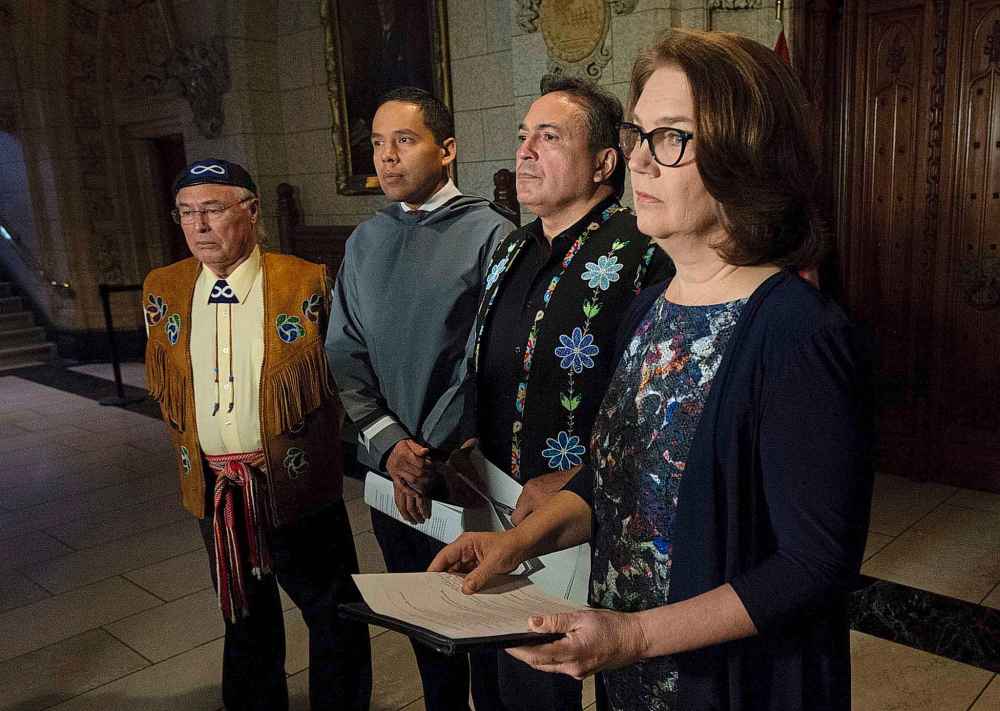Legislation to give Indigenous people control over CFS
Around 52 per cent of kids in foster care are Indigenous
Advertisement
Read this article for free:
or
Already have an account? Log in here »
To continue reading, please subscribe:
Monthly Digital Subscription
$1 per week for 24 weeks*
- Enjoy unlimited reading on winnipegfreepress.com
- Read the E-Edition, our digital replica newspaper
- Access News Break, our award-winning app
- Play interactive puzzles
*Billed as $4 plus GST every four weeks. Offer only available to new and qualified returning subscribers. Cancel any time.
Read unlimited articles for free today:
or
Already have an account? Log in here »
Hey there, time traveller!
This article was published 30/11/2018 (2254 days ago), so information in it may no longer be current.
OTTAWA — The federal government said it would introduce legislation next year in its push to give Indigenous people control over child and family services (CFS).
“These are the most vulnerable children in our country and we need to listen to them,” Indigenous Services Minister Jane Philpott told reporters Friday. “They are on a dangerous path.”
Manitoba leads the country in child-welfare apprehensions. Numerous studies link CFS involvement with poverty, drug use, going missing and ending up in jail.

Flanked by the three main national Indigenous leaders, Philpott announced plans to implement a law that would allow Indigenous leaders to run their own CFS agencies, based on six principles such as keeping families together and not removing children simply because of poverty.
Around 52 per cent of the 28,665 children in foster care in Canada who are 13 and younger are Indigenous, despite making up only 7.7 per cent of children that age, 2016 census data show.
Roughly 11,000 Manitoba children are in care, and 91 per cent of them are First Nations or Métis.
At a summit in Ottawa last January, Philpott cited U.S. legislation that gave autonomous Native American courts the ability to make child-custody decisions.
It was unclear Friday how devolving CFS would work in Manitoba, where the province sets the laws for CFS agencies and provides their funding, along with Ottawa, while Indigenous groups administer those agencies. Philpott said provinces expressed “various states of enthusiasm” in a recent phone meeting, but that there was a widespread “desire to do something different.”
Manitoba Families Minister Heather Stefanson wrote Friday that she was “eager to see the federal legislation to learn what this means for Manitoba,” noting that the province has been reforming its CFS laws. She said the province’s semi-devolved system is “already one of the most advanced among the provinces in that regard.”
The province has cited a common problem, in which case workers can only tap into government funds when they remove a child from a home. There are times when that money could be better spent to keep the child in their home. For example, CFS has removed children from overheated homes because they could not use the agency’s budget to purchase an air conditioner, despite that costing far less than putting a child into care.
The Assembly of Manitoba Chiefs (AMC) is drafting its own legislation, which it says could reverse the “humanitarian crisis” of children being apprehended. The assembly has not made its draft law public.
It says roughly 68 children a year die in CFS care in Manitoba, which is higher than the annual average of 66 deaths across Canada that took place among residential-school pupils.
The Truth and Reconciliation Commission’s (TRC) 2015 final report characterized child apprehensions as a continuation of residential schools and the ‘60s Scoop.
The very first of the TRC’s 94 calls to action relate to CFS, including asking Ottawa “to enact Aboriginal child-welfare legislation that establishes national standards for Aboriginal child apprehension and custody cases,” where Aboriginal governments run their own agencies.
Assembly of First Nations National Chief Perry Bellegarde said doing so could decrease the ratio of Aboriginal kids in care, which is higher than those who were in residential schools.
“This is more hope that that number will go down. That those children will be at home with their parents and their families, their communities, their nations,” Bellegarde said.
“That they will be surrounded with love.”
Métis National Council (MNC) president Clément Chartier said giving Métis people autonomy will help them feel like more than “third-class Indigenous people” who are often left out of programming for First Nations. “This legislation is going to take us a long way. “
The Assembly of First Nations, MNC and Inuit Tapiriit Kanatami have pledged to co-develop legislation with Ottawa and help form the programs needed to take over and safely administer CFS.
The government says it’s held 65 engagement sessions on CFS with nearly 2,000 participants over the past five months.
A summary of what Ottawa heard included “birth-alert” systems, where hospitals inform CFS workers that a woman they’ve interacted with has had a child. The phenomenon has been prevalent in Winnipeg, and Indigenous people want it be replaced with prenatal training and preventive care.
The government also heard a widespread preference for foster children being matched with families, then extended families, the child’s band or nation, other Indigenous groups and, finally, non-Indigenous families.
The Liberals have had a mixed record on CFS. Some have praised Philpott, while others, such as Bellegarde, have decried the government for taking two years to respond to a human rights tribunal that found Ottawa had underfunded CFS systems for First Nations kids for years.
Philpott admitted there are many issues afflicting Indigenous people, from poor housing and lack of access to clean water, but she said reforming CFS shouldn’t take away from tackling those issues.
“We are on a journey of reconciliation that requires the rebuilding of strong nations,” Philpott said.
dylan.robertson@freepress.mb.ca
History
Updated on Friday, November 30, 2018 9:11 PM CST: Adds photo
Updated on Saturday, December 1, 2018 12:16 PM CST: Headline changed.


